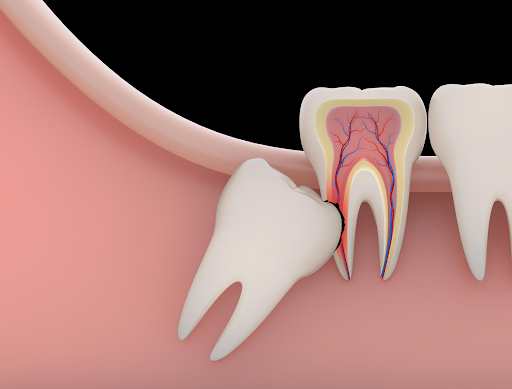Impacted Wisdom Teeth: Understanding the Woes of Third Molars

Wisdom teeth, also known as third molars, are the last teeth to erupt in the mouth, typically appearing between the ages of 17 and 21. However, sometimes these late bloomers don’t have enough space to emerge properly, becoming impacted. This can lead to a range of uncomfortable and potentially damaging issues.
Symptoms of Impacted Wisdom Teeth
Not all impacted wisdom teeth cause problems. In some cases, they may erupt partially or remain buried entirely without any noticeable symptoms. But when they do cause trouble, the signs can be quite bothersome. Here’s a rundown of the common symptoms:
- Pain and Swelling: This is a telltale sign of an impacted wisdom tooth. The pain can be throbbing, dull, or sharp, and radiate to the jaw, ear, or even the head. The surrounding gum tissue may also become red, swollen, and tender.
- Gum Problems: Impacted wisdom teeth can make it difficult to properly clean the back of your mouth, leading to gum inflammation (gingivitis) or infection (periodontitis). This can further worsen the pain and swelling.
- Bad Breath (Halitosis): Food particles can easily get trapped around an impacted wisdom tooth, contributing to bad breath.
- Difficulty Chewing: Pain or swelling can make chewing uncomfortable, especially on the side where the impacted tooth is located.
- ** неприятный вкус во рту (nepriyatnyy vkus vo rtu) (Unpleasant Taste in the Mouth):** This can be a lingering metallic or salty taste caused by infection or inflammation around the impacted tooth. ( неприятный вкус во рту (nepriyatnyy vkus vo rtu) is Russian for “unpleasant taste in the mouth”).
- Limited Jaw Opening: In severe cases, swelling can restrict your ability to open your mouth wide.
Causes of Impacted Wisdom Teeth
The human jaw size has been evolving over time, becoming smaller than that of our ancestors. This lack of space is the primary reason wisdom teeth often struggle to erupt properly. Here’s a closer look at the factors contributing to impacted wisdom teeth:
- Jaw Size: As mentioned earlier, smaller jaw size is a major culprit. The jaw simply doesn’t have enough room to accommodate all four wisdom teeth.
- Angled Position: Wisdom teeth may grow in at an angle, pushing against other teeth and preventing proper eruption.
- Bone Impaction: The wisdom tooth may be completely blocked by bone tissue, preventing it from emerging through the gums.
- Soft Tissue Impaction: Dense gum tissue or the presence of another tooth (usually the second molar) can impede the eruption of the wisdom tooth.
How to Prevent Impacted Wisdom Teeth
Unfortunately, there’s no guaranteed way to prevent impacted wisdom teeth. However, regular dental checkups and X-rays starting in the late teens can help your dentist in baulkham hills detect potential problems early on. Early detection allows for proactive measures like wisdom tooth removal before they cause any issues.
Here are some additional tips for maintaining good oral health and potentially reducing the risk of complications from impacted wisdom teeth:
- Practice good oral hygiene: Brush your teeth twice daily and floss once a day, paying particular attention to the back teeth.
- Maintain a balanced diet: Limit sugary and processed foods that can contribute to tooth decay and gum disease.
- See your dentist regularly: Schedule regular dental checkups and cleanings to ensure your oral health is on track.
When to Seek Professional Help
If you experience any of the following symptoms, it’s crucial to see your dentist or oral surgeon as soon as possible:
- Persistent pain or swelling in your jaw or face
- Difficulty opening your mouth
- Signs of infection, such as fever or pus discharge
- Redness, swelling, or bleeding gums
- Bad breath that doesn’t improve with proper oral hygiene
- Damage to surrounding teeth
Early diagnosis and treatment of impacted wisdom teeth can help prevent complications like infection, cyst formation, and damage to nearby teeth. Your dentist in parramatta or oral surgeon will assess your situation with X-rays and other diagnostic tools and recommend the best course of action. In most cases, wisdom tooth removal is the recommended treatment for impacted teeth.
Wisdom teeth removal is a common surgical procedure. While some discomfort and swelling are to be expected after surgery, following your dentist’s post-operative instructions will ensure a smooth recovery.
In conclusion, impacted wisdom teeth can be a source of pain and discomfort. By understanding the symptoms, causes, and importance of seeking professional help, you can manage these third molars effectively and maintain good oral health. Remember, early detection and intervention are key to preventing complications and ensuring a healthy smile.



